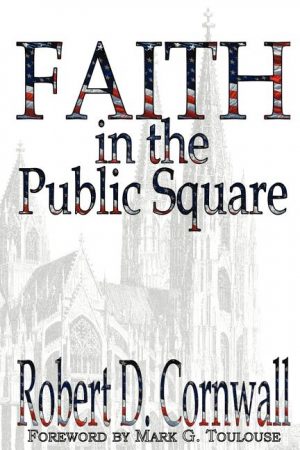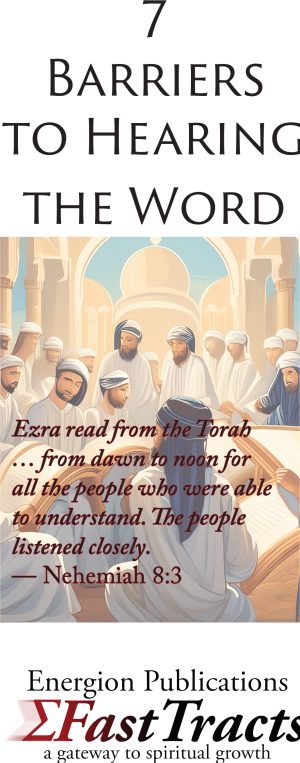Offering Peace and Forgiveness (PDF)
$0.00
Available
Description
| Carrying out the ministry of reconciliation in the church, particularly as it is done in prayer ministry. Includes identificational repentance and how to “stand in” for someone in forgiveness. Also addresses issues such as the difference between forgiveness and refusing to deal with a problem. This pamphlet would be particularly useful in training prayer teams.
It is designed to be printed on 8 1/2 x 14 paper and folded in four. |
Pamphlet text content below. Note that the FastTracts books are being edited, and their text may differ.
| He has given us the work of sharing his message about peace. – 2 Corinthians 5:19b |
| Sharing peace and forgiveness is also known as the ministry of reconciliation. It is described in 2 Corinthians 5:18 and 19. Standing in for a person – identifying yourself as another person so you can express or request forgiveness, or ask repentance. It has roots in the Biblical idea of collective repentance (Daniel 9, for example) and of standing in the gap (Ezekiel 22:30). |
Does someone need to ask for forgiveness before I can forgive them?
Carrying unforgiveness around in your heart hurts both you and the person you have not forgiven. Even if you are not asked, you can release that bitterness, receive healing, and be free of the situation.
Jesus did this for us when he died for us “even though we were sinful.” (Romans 5:8)
It is important to be reconciled with the offended party, which takes his or her cooperation. But even without that cooperation you can be free by forgiving before you are asked.
What if I just can’t forgive someone?
As God has shown us grace and mercy, we should show it to others. As God has forgiven us, we should forgive others (Matthew 6:14, 15).
When it is too difficult for us to do this we need to ask for the Holy Spirit to enable us to do so. The Holy Spirit will produce in us the fruit of the Spirit (Galatians 5:22, 23).
If I forgive someone does this cancel the consequences?
When God forgives us, this doesn’t remove us from the world, or keep us from the effects of our sin or that of others. It does release us to continue to grow and build.
Often people feel as though they cannot take any action once they have forgiven. It is better, in fact, not to take any action before we have forgiven. Forgiveness clears the air. It removes the element of revenge. It lets us deal only with the actual problem, not with our burden of guilt and bitterness.
Forgiveness frees us to deal effectively with any situation.
What is the benefit of speaking forgiveness?
If we can, we should speak forgiveness to the person who wronged us. If that is not possible, speaking publicly and releasing the offense we feel will help us to do so sincerely and completely.
In the Bible, the spoken word is very powerful. God “speaks things that are not as though they are,” (Romans 4:17). In creation God spoke and it happened! Moses and Aaron were told that by commanding, they would bring forth water for the people (Numbers 20:8). Words of blessing or cursing taken very seriously, as were words of blessing.
When a person speaks a blessing to a person who is standing in for someone who has offended them, he or she makes it clear that the words are sincere. Persons engaged in reconciliation ministry often find that a person can say “Of course I can forgive ___” but when asked to look a person in the eye and say, “I forgive you” they have trouble.
This also applies to forgiving yourself. Don’t just decide to do so. Speak it in front of someone as a witness.
What is the value of standing in for someone , or for a group of people, and requesting forgiveness?
This action allows the person to express the forgiveness directly. It is a prayer that the person will be led to seek forgiveness for their action, though you can only directly bring release to the person who is present and speaking.
Especially when this is done for a group, it is a prophetic action. (See above concerning the benefits of speaking.) Repeat it as often as is possible and necessary.
If the person you are standing in for is dead, you can still allow release for the person offering the forgiveness.
Should someone who has been angry with God speak forgiveness to God? Isn’t this irreverent?
God doesn’t need our forgiveness, but we need to release the anger and bitterness against God just as much as we do against another person. It is not sufficient just to say that there is no justification for our anger against God; we need to release that anger and formally accept God’s will.
Many people have been released to new love, praise and service to God after having spoken this kind of forgiveness.
How do I go about helping others to speak forgiveness and reconciliation?
- Always pray for the guidance of the Holy Spirit, listen for it, and follow it.
- Find out who the person needs to forgive, and what needs to be forgiven. Stand in for multiple people as necessary.
- Say something like, “I’m __(name)__. I ask your forgiveness for ______. Will you forgive me?” (Other words to this effect will work, but make sure you identify yourself as the offender.)
- If the person has difficulty giving the forgiveness, continue to pray for grace for that person to be able to forgive.
- Thank the person for their forgiveness once it is offered.
- Pray for the offender, or have the person pray for him or her.
- Offer praise and thanksgiving to God for His salvation, grace and mercy.
Is speaking forgiveness a guarantee that it is genuine?
Sometimes a person forgives without really acknowledging the hurt. You might feel that forgiveness has been offered too easily. Pray for guidance as to whether there is more to be said.
| Love your enemies. – Matthew 5:44 |
All scripture quotations taken from the Contemporary English Version, Copyright © 1995 American Bible Society.
Copyright © 1999, Henry E. Neufeld














Reviews
There are no reviews yet.